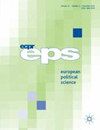European Political Science (EPS) is an international journal devoted to publishing contributions by and for the political science community. Its interpretation of 'political science' is wide and encompasses comparative politics, political economy, international relations, public administration, political theory, European studies and related disciplines. Although our traditional focus has been on European affairs and the development of the discipline, we are always on the lookout for work that compares politics in Europe with other continents and countries, and more general work (on other regions) that would be of interest to European political scientists (our main readership). As the professional journal of the European Consortium for Political Research, EPS is also a prime outlet for research notes and opinion pieces about the political science profession, including teaching and learning contributions, as well as symposia and academic debates. As a new initiative, we also publish original datasets.
欧洲政治学(英语:European Political Science,缩写EPS)是一份国际性期刊,致力于出版政治学领域的论文。它对“政治学”的解释范围很广,包括比较政治学、政治经济学、国际关系、公共行政、政治理论、欧洲研究和相关学科。虽然我们的传统焦点一直是欧洲事务和学科发展,但我们始终在寻找将欧洲政治与其他大陆和国家进行比较的作品,以及欧洲政治学家(我们的主要读者群)感兴趣的更一般性的作品(关于其他地区)。作为欧洲政治研究联盟的专业期刊,EPS也是关于政治学专业的研究笔记和观点文章的主要渠道,包括教学和学习贡献,以及研讨会和学术辩论。作为一项新举措,我们还发布了原始数据集。
Social media populism: features and ‘likeability’ of Lega Nord communication on Facebook
来源期刊:European Political ScienceDOI:10.1057/S41304-017-0141-8
Disagreeable narcissists, extroverted psychopaths, and elections: a new dataset to measure the personality of candidates worldwide
来源期刊:European Political ScienceDOI:10.1057/S41304-018-0187-2
The populism/anti-populism frontier and its mediation in crisis-ridden Greece: from discursive divide to emerging cleavage?
来源期刊:European Political ScienceDOI:10.1057/S41304-017-0138-3
Where’s populism? Online media and the diffusion of populist discourses and styles in Portugal
来源期刊:European Political ScienceDOI:10.1057/S41304-017-0137-4
Was the Brexit referendum legitimate, and would a second one be so?
来源期刊:European Political ScienceDOI:10.1057/S41304-018-0155-X
Introduction: populist discourses and political communication in Southern Europe
来源期刊:European Political ScienceDOI:10.1057/S41304-017-0139-2
Non-universal suffrage: measuring electoral inclusion in contemporary democracies
来源期刊:European Political ScienceDOI:10.1057/S41304-019-00202-8
Reflexive technopopulism: Podemos and the search for a new left-wing hegemony
来源期刊:European Political ScienceDOI:10.1057/S41304-017-0140-9
British public opinion on Brexit: controversies and contradictions
来源期刊:European Political ScienceDOI:10.1057/S41304-018-0156-9
For participatory democracy: some notes
来源期刊:European Political ScienceDOI:10.1057/S41304-018-0198-Z
WE have to change! The carbon footprint of ECPR general conferences and ways to reduce it
来源期刊:European Political ScienceDOI:10.1057/s41304-019-00220-6
Informal negotiations in EU legislative decision-making: a systematic review and research agenda
来源期刊:European Political ScienceDOI:10.1057/s41304-019-00213-5
Training graduate teaching assistants: What can the discipline offer?
来源期刊:European Political ScienceDOI:10.1057/S41304-018-0175-6
Britain’s EU referendum: How did political science rise to the challenge? An assessment of online contributions during the campaign
来源期刊:European Political ScienceDOI:10.1057/S41304-018-0174-7
Turnout, party system diversity and left-of-centre parties: explaining turnout through the strength of left-of-centre parties
来源期刊:European Political ScienceDOI:10.1057/S41304-017-0136-5
Italians do it better? The Italian approach to the international relations
来源期刊:European Political ScienceDOI:10.1057/S41304-019-00207-3
Hearing everyone in the feedback loop: using the new discussion platform, Unitu, to enhance the staff and student dialogue
来源期刊:European Political ScienceDOI:10.1057/S41304-019-00211-7
The Brexit negotiations: If anywhere, where are we heading? “It is complicated”
来源期刊:European Political ScienceDOI:10.1057/S41304-018-0157-8
Using audience response systems to amplify student learning in political science: a case study of electoral systems teaching
来源期刊:European Political ScienceDOI:10.1057/S41304-018-0188-1
European integration and British membership: Still an intergovernmentalist story?
来源期刊:European Political ScienceDOI:10.1057/S41304-018-0154-Y
Undergraduate peer review, reading and writing: reflecting on experiences from an International Politics module
来源期刊:European Political ScienceDOI:10.1057/S41304-018-0178-3




